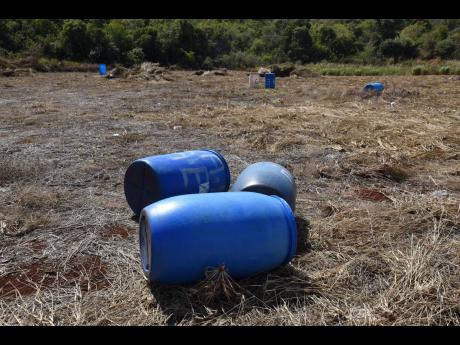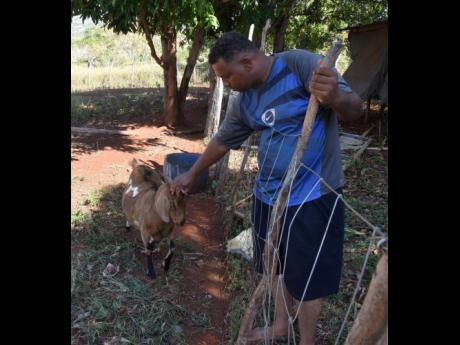‘No use staying on a sinking ship’
Frustration mounts for Flagaman farmers
The local agricultural sector continues to suffer from the absence of a structured long-term plan to take off excess produce in times of glut and use them in drinks, purées and pastes or even preserve them through dehydration or canning. A number...
The local agricultural sector continues to suffer from the absence of a structured long-term plan to take off excess produce in times of glut and use them in drinks, purées and pastes or even preserve them through dehydration or canning.
A number of farmers are lamenting that too often, responses to the problems attract only knee-jerk responses and for this reason, many are looking to diversify their operations or exit the sector.
Forty-year-old Gary Ebanks of Flagaman in the island’s Breadbasket Parish, St Elizabeth, told The Gleaner that successive administrations have been guilty of failing to implement policies grounded in effective legislation to take the country closer to achieving a substantive level of food security and nutrition.
“The big problem we are having now is that the price of everything has gone up and the price of the goods has stagnated, so there is not a lot of profit in farming any more because the cost of production has jumped so high over the past five years,” he lamented last Wednesday.
With the National Irrigation Commission having provided water to the nearby community of Beacon, Ebanks and many other farmers in Flagaman have opted to move their investments to this area, operating on leased lands.
While welcoming this sustainable source of water, which means that they can cultivate consistently, it has also resulted in significant increases in overhead expenses, some of which they did not have when solely dependent on rain-fed agriculture. These include the lease, paying for irrigation water, as well as the cost of transporting workers, which also drives up fuel expenses.
Ebanks was born into farming; his great-grandparents set the pace, a tradition that continued with his parents, uncles and aunts, cousins. In fact, his family had one of the largest melon operations in southern St Elizabeth with between 10 and 15 acres under cultivation at a time.
THINGS HAVE CHANGED
Now, things have changed.
“The country is reaching a stage where you can no longer make a comfortable living out of it, so what’s the point of continuing?” the frustrated farmer asked.
Ebanks regularly takes his children to the farm, as his parents did with him, so they can understand and appreciate the value of agriculture. However, he admitted that he does not want them to follow in his footsteps.
“Mi show them mi hands and mi say, ‘It’s either this or the book. Make up your mind’,” he said, adding that he is hopeful that the sight of his chapped, gnarled fingers – a part of the price he has paid for the long, strenuous hours spent in the fields in the broiling sun – will drive home a powerful message to his young children.
Things took a turn for the worse a few years ago, when several farmers found that the mature melons, though firm on the outside, were mushy inside with the pulp in some cases reduced to liquid, causing them to absorb millions of dollars in losses. The inability of the Rural Agricultural Development Authority (RADA) to provide a satisfactory explanation of the cause of the problem or how to address it has not eased their concerns, according to Ebanks.
“We have had a problem for the past two years with watermelon that nobody has solved. We can’t understand what is causing that and people now are moving away from cultivating watermelons, with about 90 per cent of the melon farmers having diverted into other areas. We can’t say that it is due to climate change or some form of disease,” he told The Gleaner.
Continued Ebanks: “RADA tries, but how much can RADA really do? Most of the time, RADA officers come around and ask us questions. So is like they collect information from some farmers and then use it to advise other farmers.”
PIVOT OR LEAVE
The lifelong farmer is also mulling over plans to pivot or exit the sector.
“I am thinking of coming out. Everything down here is built from farming, but that doesn’t mean that you going to stay on a sinking ship. So you have to start diverting to other areas of farming, to include greenhouse farming, so that certain crops you can cultivate year-round. Climate problems are causing us to look in that direction,” said Ebanks.
“But things like that cost millions of dollars and even if you want a greenhouse, there is nobody to say, ‘This is the type of thing that you want to go into, ... here is how we can help you to go that route’,” he lamented.
“Is only when things go good dem come down [to boast] that it was in my jurisdiction that this happened, but when the bad comes, you can’t see nobody and so you going to have to stay under the sufferation until you help yourself to climb out,” he further bemoaned.
The perilous state of crop farming has pushed Ebanks into diversifying into livestock, starting with a few goats and some broiler chickens.


